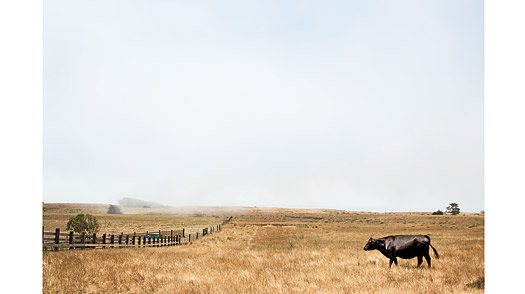
One of more than 100 cattle on Bill Niman's California property, home of an ongoing experiment in sustainable ranching.
(4 of 8)
Pound for pound, a pig produces approximately four times the amount of waste a human does, and what factory farms do with that mess gets comparatively little oversight. Most hog waste is disposed of in open-air lagoons, which can overflow in heavy rain and contaminate nearby streams and rivers. "This creek that we used to wade in, that creek that our parents could drink out of, our kids can't even play in anymore," says Jayne Clampitt, a farmer in Independence, Iowa, who lives near a number of hog farms.
To stay alive and grow in such conditions, farm animals need pharmaceutical help, which can have further damaging consequences for humans. Overuse of antibiotics on farm animals leads, inevitably, to antibiotic-resistant bacteria, and the same bugs that infect animals can infect us too. The UCS estimates that about 70% of antimicrobial drugs used in America are given not to people but to animals, which means we're breeding more of those deadly organisms every day. The Institute of Medicine estimated in 1998 that antibiotic resistance cost the public-health system $4 billion to $5 billion a year--a figure that's almost certainly higher now. "I don't think CAFOs would be able to function as they do now without the widespread use of antibiotics," says Robert Martin, who was the executive director of the Pew Commission on Industrial Farm Animal Production.
The livestock industry argues that estimates of antibiotics in food production are significantly overblown. Resistance "is the result of human use and not related to veterinary use," according to Kristina Butts, the manager of legislative affairs for the National Cattlemen's Beef Association. But with wonder drugs losing their effectiveness, it makes sense to preserve them for as long as we can, and that means limiting them to human use as much as possible. "These antibiotics are not given to sick animals," says Representative Louise Slaughter, who is sponsoring a bill to limit antibiotic use on farms. "It's a preventive measure because they are kept in pretty unspeakable conditions."
Such a measure would get at a symptom of the problem but not at the source. Just as the burning of fossil fuels that is causing global warming requires more than a tweaking of mileage standards, the manifold problems of our food system require a comprehensive solution. "There should be a recognition that what we are doing is unsustainable," says Martin. And yet, still we must eat. So what can we do?
Getting It Right
